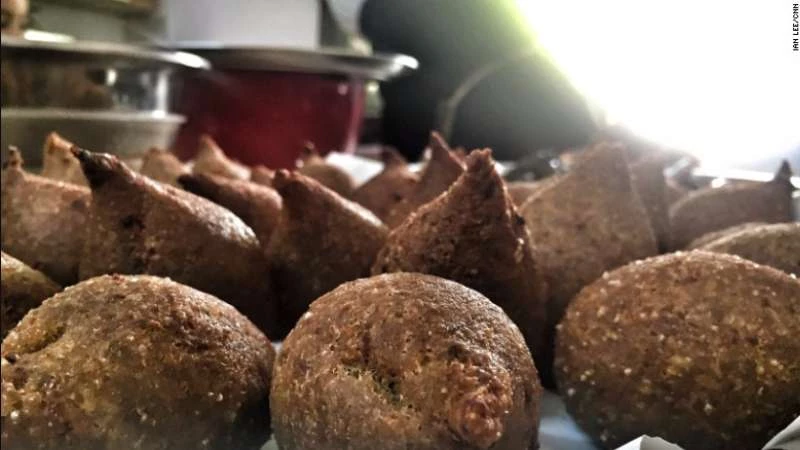Her family encouraged her, urging her to open a restaurant and share her culinary prowess.
But in 2011, everything changed. War ripped apart Syria and one day Kassah and her husband were forced to make a tough decision.
"We left Syria because our house was destroyed and there was no school for my children," says the mother of three.
Keeping culture alive
Today, Kassah is back in the kitchen alongside six other Syrian refugees, working for catering service Zeit Zeitoun, olive oil in Arabic.
Wafting aromas of home fill the community center in the Cairo suburb of El Obour as the women take turns stirring a large container of lentil stew, adding copious amounts of sugar and pomegranate molasses.
They disagree over the origin of the dish’s name: harra esbae’o, or "he burned his finger."
Most hold that the continuous stirring the recipe requires will eventually burn the fingers holding the spoon, but Tamara Al-Rifai, who founded the business, interjects with a more colorful story: the husband of the woman who invented the recipe couldn’t wait and dipped his finger in the stew to taste as it was still boiling.
"Cooking revives the Syrian cultural heritage by making Syrian food constantly available to people," says Kassah, who now leads the kitchen.
"We preserve the heritage of our families and ancestors."
Culinary disputes
Every woman has brought her recipes and signature dish. They put them together in a simple menu grounded in popular foods: kebba, a meat croquette; stuffed grape leaves; and sambosek, a pastry filled with cheese.
They are working on standardizing their recipes and portions while gradually adding more Syrian influences.
As they caramelize onions and season sauces, they jokingly argue over whose food is better, the Damascenes’ or the minority from Aleppo and Homs.
"Aleppo cooking involves a lot of lime, it adds an acidic taste to food," says Damascus native Ghosson Mostafa.
The secret to Syrian food is "caring and variety," according to Kassah. This is achieved by maintaining a balance of flavors, between sour and sweet.
Zeit Zeitoun’s vine leaves and stuffing are drenched in pomegranate molasses -- a crucial ingredient in Syrian cuisine.
’We had nothing’
Beyond cooking, the women have formed a support group of sorts.
They come burdened with loss, trauma and failed attempts to integrate and make a living.
Mostafa’s family first settled in the coastal town of Alexandria. After thugs destroyed her husband’s restaurant, taking with it all their savings, he moved back to Syria and was arrested. She relocated to Cairo and now supports her three children.
Hassna Aly is originally from Darayya. When she first arrived in Egypt three years ago, her husband stayed in bed for 15 days, unable to overcome the feeling of loss.
"It was like doomsday, we had nothing," Aly says. She took up various handicrafts to earn some money.
Several of the women are the primary breadwinners in their families.
"I always thought that you don’t truly empower people unless you give them a source of income," says Al-Rifai, who spent her career helping victims of conflicts.
"You make them become financially independent and able to decide for themselves what they want to do."
Al-Rifai, who left Syria long before the war, raised funds to equip the kitchen in a bid to help the women find sustainable income.
United by food
The women follow news from home closely, hoping for the day when fighting stops and they can go back. But until then, the kitchen work is a chance to disconnect.
"If we only think about war, we won’t be able to take any step forward," says Kassah.
For the sake of their children, some of whom are still struggling to forget the horrors they saw, the women are focused on adapting to life in Egypt.
"It’s just a group of women having fun together like we would during any big festive celebration back home in Syria," says Al-Rifai.
"The cuisine, the kitchen, the love of food and the centrality of food in the Syrian home is extremely important for us now when we feel like everything else is dividing us."



التعليقات (0)